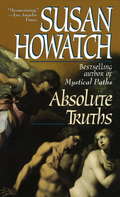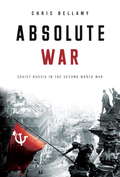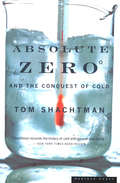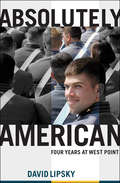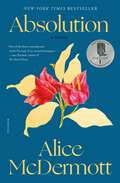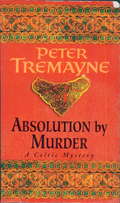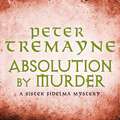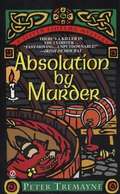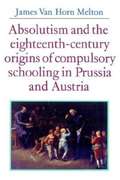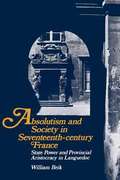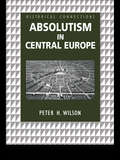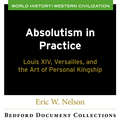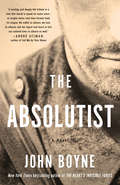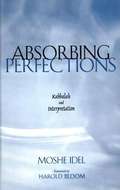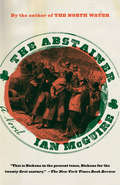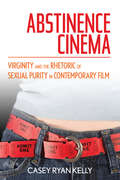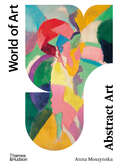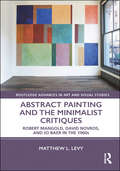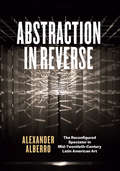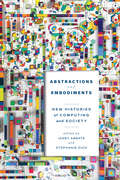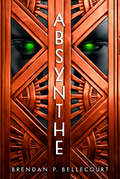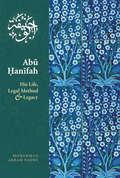- Table View
- List View
Absolute Truths (Church of England #6)
by Susan Howatch"A SKILLFUL BLEND OF CHARACTER, PHILOSOPHY AND NARRATIVE. . .Formidable personalities embroil themselves in ruthless power struggles that would make a corporate raider blush."--The Washington Post Book World. It is 1965, and Charles Ashworth has attained the plum position of bishop of Starbridge, an honor that keeps him in a heady whirl of activity that would exhaust the most seasoned corporate executive. With the invaluable support of his minions and his attractive, unsinkable wife, Ashworth stands against the amorality and decadence of the age--"Anti-Sex Ashworth." He slays his opponents by being a tough, efficient, confident churchman, the torments of his past long since dead and buried.And then the unexpected, the unthinkable, strikes.Suddenly Ashworth finds himself staring into the chasm of all the lies hes been telling himself for years: about his marriage, his children, even his views on the Church. And as he suspects his old nemesis and dean, Neville Aysgarth, of drinking too much, of financial chicanery, of--God forbid--having an affair, Ashworth discovers to his horror that he is tempted to commit the very acts that he has so publicly denounced. . . . "ENTHRALLING. . .Rich, dense, almost indecently entertaining."--San Jose Mercury News "POWERFUL. . .MIRACULOUS."--Booklist (starred review) SELECTED BY THE BOOK-OF-THE-MONTH CLUB.
Absolute War: Soviet Russia in the Second World War
by Chris BellamyIn Absolute War, acclaimed historian and journalist Chris Bellamy crafts the first full account since the fall of the Soviet Union of World War II's battle on the Eastern Front, one of the deadliest conflicts in history. The conflict on the Eastern Front, fought between the Soviet Union and Nazi Germany between 1941 and 1945, was the greatest, most costly, and most brutal conflict on land in human history. It was arguably the single most decisive factor of the war, and shaped the postwar world as we know it. In this magisterial work, Bellamy outlines the lead-up to the war, in which the fragile alliance between the two dictators was unceremoniously broken, and examines its far-reaching consequences, arguing that the cost of victory was ultimately too much for the Soviet Union to bear. With breadth of scope and a surfeit of new information, this is the definitive history of a conflict whose reverberations are still felt today.From the Trade Paperback edition.
Absolute Zero and the Conquest of Cold
by Tom Shachtman&“A lovely, fascinating book, which brings science to life.&” —Alan Lightman Combining science, history, and adventure, Tom Shachtman &“holds the reader&’s attention with the skill of a novelist&” as he chronicles the story of humans&’ four-centuries-long quest to master the secrets of cold (Scientific American). &“A disarming portrait of an exquisite, ferocious, world-ending extreme,&” Absolute Zero and the Conquest of Cold demonstrates how temperature science produced astonishing scientific insights and applications that have revolutionized civilization (Kirkus Reviews). It also illustrates how scientific advancement, fueled by fortuitous discoveries and the efforts of determined individuals, has allowed people to adapt to—and change—the environments in which they live and work, shaping man&’s very understanding of, and relationship, with the world. This &“truly wonderful book&” was adapted into an acclaimed documentary underwritten by the National Science Foundation and the Alfred P. Sloan Foundation, directed by British Emmy Award winner David Dugan, and aired on the BBC and PBS&’s Nova in 2008 (Library Journal). &“An absorbing account to chill out with.&” —Booklist
Absolutely American: Four Years at West Point
by David LipskyNew York Times Bestseller: A &“fascinating, funny and tremendously well written&” chronicle of daily life at the US Military Academy (Time). In 1998, West Point made an unprecedented offer to Rolling Stone writer David Lipsky: Stay at the Academy as long as you like, go wherever you wish, talk to whomever you want, to discover why some of America&’s most promising young people sacrifice so much to become cadets. Lipsky followed one cadet class into mess halls, barracks, classrooms, bars, and training exercises, from arrival through graduation. By telling their stories, he also examines the Academy as a reflection of our society: Are its principles of equality, patriotism, and honor quaint anachronisms or is it still, as Theodore Roosevelt called it, the most &“absolutely American&” institution? During an eventful four years in West Point&’s history, Lipsky witnesses the arrival of TVs and phones in dorm rooms, the end of hazing, and innumerable other shifts in policy and practice. He uncovers previously unreported scandals and poignantly evokes the aftermath of September 11, when cadets must prepare to become officers in wartime. Lipsky also meets some extraordinary people: a former Eagle Scout who struggles with every facet of the program, from classwork to marching; a foul-mouthed party animal who hates the military and came to West Point to play football; a farm-raised kid who seems to be the perfect soldier, despite his affection for the early work of Georgia O&’Keeffe; and an exquisitely turned-out female cadet who aspires to &“a career in hair and nails&” after the Army. The result is, in the words of David Brooks in the New York Times Book Review, &“a superb description of modern military culture, and one of the most gripping accounts of university life I have read. . . . How teenagers get turned into leaders is not a simple story, but it is wonderfully told in this book.&”
Absolutely Not New York
by Charlene MiresFrom 1944 to 1946, as the world pivoted from the Second World War to an unsteady peace, the newly-created United Nations needed a meeting place, a central place for global diplomacy. But what would it look like, and where would it be? At times it seemed the world's diplomats could agree on only one thing: under no circumstances did they want the United Nations to be based in New York. And for its part, New York worked mightily just to stay in the race it would eventually win. In vivid detail, Charlene Mires traces New York's long and often complicated journey to host the United Nations.
Absolution: A Novel
by Alice McDermottAN INSTANT NEW YORK TIMES BESTSELLERNamed a Best Book of the Year by Time, Esquire, Good Housekeeping, Kirkus Reviews, Los Angeles Times, NPR, Oprah Daily, Real Simple, and VogueA riveting account of women’s lives on the margins of the Vietnam War, from the renowned winner of the National Book Award.You have no idea what it was like. For us. The women, I mean. The wives.American women—American wives—have been mostly minor characters in the literature of the Vietnam War, but in Absolution they take center stage. Tricia is a shy newlywed, married to a rising attorney on loan to navy intelligence. Charlene is a practiced corporate spouse and mother of three, a beauty and a bully. In Saigon in 1963, the two women form a wary alliance as they balance the era’s mandate to be “helpmeets” to their ambitious husbands with their own inchoate impulse to “do good” for the people of Vietnam.Sixty years later, Charlene’s daughter, spurred by an encounter with an aging Vietnam vet, reaches out to Tricia. Together, they look back at their time in Saigon, taking wry account of that pivotal year and of Charlene’s altruistic machinations, and discovering how their own lives as women on the periphery—of politics, of history, of war, of their husbands’ convictions—have been shaped and burdened by the same sort of unintended consequences that followed America’s tragic interference in Southeast Asia.A virtuosic new novel from Alice McDermott, one of our most observant, most affecting writers, about folly and grace, obligation, sacrifice, and, finally, the quest for absolution in a broken world.
Absolution by Murder: The first twisty tale in a gripping Celtic mystery series (Sister Fidelma)
by Peter TremayneABSOLUTION BY MURDER is the brilliant and evocative first novel in Peter Tremayne's Sister Fidelma series, bringing 7th-century Ireland vividly to life.PRAISE FOR ABSOLUTION BY MURDER: 'In the simultaneously sharp-tongued and full womanly figure of Sister Fidelma, Tremayne has created a heroine whom many readers will willingly follow. Even Brother Cadfael might have tolerated her' Kirkus Reviews As the leading churchmen and women gather at the Synod of Whitby in 664AD to debate the rival merits of the Celtic and Roman Churches, tempers begin to fray. Conspirators plot an assassination, while mysterious, violent death stalks the shadowy cloisters of the Abbey of St Hilda. When the Abbess Etain, a leading speaker for the Celtic Church, is found murdered suspicion inevitably rests on the Roman faction.Attending the Synod is Fidelma, of the community of St Brigid of Kildare. As an advocate of the Brehon Court, she is called on to investigate the murder with Brother Eadulf, of the Roman faction. However, the two are so unlike that their partnership is described as that of a wolf and a fox - but which is which?More gruesome deaths follow and the friction among the clerics could end in civil war. Can the solution to the mysteries avert such a conflict?What readers are saying about ABSOLUTION OF MURDER:'Superb storytelling from a usually neglected era. Read this and you will certainly want to read the rest of this excellent series''I was transported back in time; Peter Tremayne brought the location and characters to life''The story moves forward with Fidelma weaving her way through to the end with skill and intelligence. Well worth reading'
Absolution by Murder: The first twisty tale in a gripping Celtic mystery series (Sister Fidelma)
by Peter TremayneABSOLUTION BY MURDER is the brilliant and evocative first novel in Peter Tremayne's Sister Fidelma series, bringing 7th-century Ireland vividly to life.As the leading churchmen and women gather at the Synod of Whitby in 664AD to debate the rival merits of the Celtic and Roman Churches, tempers begin to fray. Conspirators plot an assassination, while mysterious, violent death stalks the shadowy cloisters of the Abbey of St Hilda. When the Abbess Etain, a leading speaker for the Celtic Church, is found murdered suspicion inevitably rests on the Roman faction.Attending the Synod is Fidelma, of the community of St Brigid of Kildare. As an advocate of the Brehon Court, she is called on to investigate the murder with Brother Eadulf, of the Roman faction. However, the two are so unlike that their partnership is described as that of a wolf and a fox - but which is which?More gruesome deaths follow and the friction among the clerics could end in civil war. Can the solution to the mysteries avert such a conflict?(P) 2015 Audible, Inc
Absolution by Murder: A Mystery of Ancient Ireland (Sister Fidelma Mystery #1)
by Peter TremayneIn seventh century Ireland, the Irish Church and Church of Rome convene a special council to reconcile the differences of their individual religious doctrines. Outspoken and sharp, the young Sister Fidelma of Kildare is among those asked to attend. But when the leading Celtic speaker is found savagely murdered, Sister Fidelma must quickly unmask the culprit--before this debate dissolves into all-out civil war!
Absolution by Murder (Sister Fidelma Mysteries Book 1): The first twisty tale in a gripping Celtic mystery series
by Peter TremayneABSOLUTION BY MURDER is the brilliant and evocative first novel in Peter Tremayne's Sister Fidelma series, bringing 7th-century Ireland vividly to life.PRAISE FOR ABSOLUTION BY MURDER: 'In the simultaneously sharp-tongued and full womanly figure of Sister Fidelma, Tremayne has created a heroine whom many readers will willingly follow. Even Brother Cadfael might have tolerated her' Kirkus ReviewsAs the leading churchmen and women gather at the Synod of Whitby in 664AD to debate the rival merits of the Celtic and Roman Churches, tempers begin to fray. Conspirators plot an assassination, while mysterious, violent death stalks the shadowy cloisters of the Abbey of St Hilda. When the Abbess Etain, a leading speaker for the Celtic Church, is found murdered suspicion inevitably rests on the Roman faction.Attending the Synod is Fidelma, of the community of St Brigid of Kildare. As an advocate of the Brehon Court, she is called on to investigate the murder with Brother Eadulf, of the Roman faction. However, the two are so unlike that their partnership is described as that of a wolf and a fox - but which is which?More gruesome deaths follow and the friction among the clerics could end in civil war. Can the solution to the mysteries avert such a conflict?What readers are saying about ABSOLUTION OF MURDER:'Superb storytelling from a usually neglected era. Read this and you will certainly want to read the rest of this excellent series''I was transported back in time; Peter Tremayne brought the location and characters to life''The story moves forward with Fidelma weaving her way through to the end with skill and intelligence. Well worth reading'
Absolutism And The Eighteenth-century Origins Of Compulsory Schooling In Prussia And Austria
by James Van Horn MeltonCompulsory schooling is widely held to be a creation of modern industrial society. Yet already in the eighteenth century, Prussian and Austrian rulers attempted to introduce universal education in societies that were overwhelmingly rural and 'premodern'. Focusing on the reigns of Frederick the Great of Prussia (1740–86) and Maria Theresa of Austria (1740–80), this 1988 book examines the origins, aims, and achievements of the compulsory school movements in those states. It draws on a broad range of sources in showing how school reform was part of a broader campaign to strengthen relationships of authority and dependence. Local resistance as well as the contradictory aims of absolutist rule severely limited the success of school reform. But in their effort to promote literate culture on an unprecedented scale, reformers established pedagogical institutions and practices that would decisively shape public education not only in Central Europe, but throughout the West.
Absolutism and Society In Seventeenth-Century France: State Power and Provincial Aristocracy in Languedoc
by William BeikWhy was Louis XIV successful in pacifying the same aristocrats who had caused so much trouble for Richelieu and Mazarin? What role did absolutism play in reinforming or changing the traditional social system in seventeenth-century France? In this analysis of the provincial reality of absolutism, Professor Beik argues that the answers to these questions lie in the relationship between the regional aristocracy and the crown. Starting with a critical examination of current approaches to state and society by institutional, social , 'Annales', and Marxist historians, he calls for a new class analysis based on the findings of all these schools. This is the first appearance as a paperback of Professor Beik's book, which won the 1986 Herbert Baxter Adams Prize awarded by the American historical Association for the year's outstanding work in European history.
Absolutism in Central Europe (Historical Connections)
by Peter WilsonAbsolutism in Central Europe is about the form of European monarchy known as absolutism, how it was defined by contemporaries, how it emerged and developed, and how it has been interpreted by historians, political and social scientists. This book investigates how scholars from a variety of disciplines have defined and explained political development across what was formerly known as the 'age of absolutism'. It assesses whether the term still has utility as a tool of analysis and it explores the wider ramifications of the process of state-formation from the experience of central Europe from the early seventeenth century to the start of the nineteenth.
Absolutism in Practice: Louis XIV, Versailles, and the Art of Personal Kingship (Bedford Document Collection )
by Eric W. NelsonThis document collection explores how Louis XIV sought to embody absolutism through his personal rule by examining the theory behind absolutism, Louis's own writings on kingship, and the observations of eyewitnesses at his court, shedding light on traditions of royal government in Europe since the Middle Ages. Students are guided through their analysis of the primary sources with an author-provided learning objective, central question, and historical context.
The Absolutist: A Novel by the Author of The Heart's Invisible Furies
by John BoyneA masterfully told tale of passion, jealousy, heroism and betrayal set in the gruesome trenches of World War I.It is September 1919: twenty-one-year-old Tristan Sadler takes a train from London to Norwich to deliver a package of letters to the sister of Will Bancroft, the man he fought alongside during the Great War. But the letters are not the real reason for Tristan's visit. He can no longer keep a secret and has finally found the courage to unburden himself of it. As Tristan recounts the horrific details of what to him became a senseless war, he also speaks of his friendship with Will--from their first meeting on the training grounds at Aldershot to their farewell in the trenches of northern France. The intensity of their bond brought Tristan happiness and self-discovery as well as confusion and unbearable pain.The Absolutist is a masterful tale of passion, jealousy, heroism, and betrayal set in one of the most gruesome trenches of France during World War I. This novel will keep readers on the edge of their seats until its most extraordinary and unexpected conclusion, and will stay with them long after they've turned the last page.
Absorbing Perfections: Kabbalah and Interpretation
by Moshe IdelThis book deals mainly with material found in a vast body of literature designated by its authors and by modern scholars as Kabbalah. Basically a medieval corpus, this literature consists of a variety of schools, trends, models, ideals, and techniques.
The Abstainer: A Novel
by Ian McGuire&“A brilliant historical novel; part Cormac McCarthy and part Raymond Chandler.&”—Philipp Meyer, author of The SonAn Irishman in nineteenth-century England is forced to take sides when his nephew joins the bloody underground movement for independence in this propulsive novel from the acclaimed author of The North Water. Manchester, England, 1867. The rebels will be hanged at dawn, and their brotherhood is already plotting its revenge. Stephen Doyle, an Irish-American veteran of the Civil War, arrives in Manchester from New York with a thirst for blood. He has joined the Fenians, a secret society intent on ending British rule in Ireland by any means necessary. Head Constable James O&’Connor has fled grief and drink in Dublin for a sober start in Manchester. His job is to discover and thwart the Fenians&’ plans whatever they might be. When a long-lost nephew arrives on O&’Connor&’s doorstep looking for work, he cannot foresee the way his fragile new life will be imperiled—and how his and Doyle&’s fates will become fatally intertwined. In this propulsive tale of the underground war for Irish independence, the author of The North Water once again transports readers to a time when blood begot blood. Moving from the dirt and uproar of industrial Manchester to the quiet hills of rural Pennsylvania, The Abstainer is a searing novel in which two men, haunted by their pasts and driven forward by the need for justice and retribution, must fight for life and legacy.
Abstinence Cinema: Virginity and the Rhetoric of Sexual Purity in Contemporary Film
by Casey Ryan KellyFrom the perspective of cultural conservatives, Hollywood movies are cesspools of vice, exposing impressionable viewers to pernicious sexually-permissive messages. Offering a groundbreaking study of Hollywood films produced since 2000, Abstinence Cinema comes to a very different conclusion, finding echoes of the evangelical movement's abstinence-only rhetoric in everything from Easy A to Taken. Casey Ryan Kelly tracks the surprising sex-negative turn that Hollywood films have taken, associating premarital sex with shame and degradation, while romanticizing traditional nuclear families, courtship rituals, and gender roles. As he demonstrates, these movies are particularly disempowering for young women, concocting plots in which the decision to refrain from sex until marriage is the young woman's primary source of agency and arbiter of moral worth. Locating these regressive sexual politics not only in expected sites, like the Twilight films, but surprising ones, like the raunchy comedies of Judd Apatow, Kelly makes a compelling case that Hollywood films have taken a significant step backward in recent years. Abstinence Cinema offers close readings of movies from a wide spectrum of genres, and it puts these films into conversation with rhetoric that has emerged in other arenas of American culture. Challenging assumptions that we are living in a more liberated era, the book sounds a warning bell about the powerful cultural forces that seek to demonize sexuality and curtail female sexual agency.
Abstract Art: Second Edition (World of Art #0)
by Anna MoszynskaAn exceptionally clear, thorough, and well- illustrated introduction to abstract art since 1900. Since the early years of the twentieth century, Western abstract art has fascinated, outraged, and bewildered audiences. Its path to acceptance within the artistic mainstream was slow. This revised edition traces the origins and evolution of abstract art, placing it in broad cultural context. Well-respected scholar Anna Moszynska examines the pioneering work of Hilma af Klint, Wassily Kandinsky, Kazimir Malevich, and Piet Mondrian alongside the Russian Constructivists, the De Stijl group, and the Bauhaus artists, contrasting European geometric abstraction in the 1930s and ’40s with the emphasis on personal expression after World War II. Op, kinetic, and minimal art of the postwar period is discussed and illustrated in detail, and new chapters bring the account up to date, exploring the crisis in abstraction of the 1980s and its revival—in paint, fabric, sculpture, and installation—in recent decades. The first edition of Abstract Art, published in 1990, was acclaimed by reviewers. Revised with extensive updates, this book includes new chapters on recent trends and offers fully global coverage of art produced in North and South America, Europe, China, Korea, and the Middle East. Now in full color and comprehensively revised, it will serve as the best introduction to abstract art for a new generation.
Abstract Painting and the Minimalist Critiques: Robert Mangold, David Novros, and Jo Baer in the 1960s (Routledge Advances in Art and Visual Studies)
by Matthew L. LevyThis book undertakes a critical reappraisal of Minimalism through an examination of three key painters: Robert Mangold, David Novros, and Jo Baer. By establishing their substantive engagements with Minimalist discourse, as well as their often overlooked artistic exchanges with their sculptor peers, it demonstrates that painting crucially informed the movement’s development, serving not only as an object of critique but also as a crucible for its most central tenets. It also poses broader disciplinary implications as it historicizes and challenges Minimalism’s "death of painting" critiques that have been so influential to theories of modernism and postmodernism in the visual arts.
Abstraction in Reverse: The Reconfigured Spectator in Mid-Twentieth-Century Latin American Art
by Alexander AlberroDuring the mid-twentieth century, Latin American artists working in several different cities radically altered the nature of modern art. Reimagining the relationship of art to its public, these artists granted the spectator an unprecedented role in the realization of the artwork. The first book to explore this phenomenon on an international scale, Abstraction in Reverse traces the movement as it evolved across South America and parts of Europe. Alexander Alberro demonstrates that artists such as Tomás Maldonado, Jesús Soto, Julio Le Parc, and Lygia Clark, in breaking with the core tenets of the form of abstract art known as Concrete art, redefined the role of both the artist and the spectator. Instead of manufacturing autonomous art, these artists produced artworks that required the presence of the spectator to be complete. Alberro also shows the various ways these artists strategically demoted regionalism in favor of a new modernist voice that transcended the traditions of the nation-state and contributed to a nascent globalization of the art world.
Abstractions and Embodiments: New Histories of Computing and Society (Studies in Computing and Culture)
by Janet Abbate and Stephanie DickCutting-edge historians explore ideas, communities, and technologies around modern computing to explore how computers mediate social relations.Computers have been framed both as a mirror for the human mind and as an irreducible other that humanness is defined against, depending on different historical definitions of "humanness." They can serve both liberation and control because some people's freedom has historically been predicated on controlling others. Historians of computing return again and again to these contradictions, as they often reveal deeper structures.Using twin frameworks of abstraction and embodiment, a reformulation of the old mind-body dichotomy, this anthology examines how social relations are enacted in and through computing. The authors examining "Abstraction" revisit central concepts in computing, including "algorithm," "program," "clone," and "risk." In doing so, they demonstrate how the meanings of these terms reflect power relations and social identities. The section on "Embodiments" focuses on sensory aspects of using computers as well as the ways in which gender, race, and other identities have shaped the opportunities and embodied experiences of computer workers and users. Offering a rich and diverse set of studies in new areas, the book explores such disparate themes as disability, the influence of the punk movement, working mothers as technical innovators, and gaming behind the Iron Curtain. Abstractions and Embodiments reimagines computing history by questioning canonical interpretations, foregrounding new actors and contexts, and highlighting neglected aspects of computing as an embodied experience. It makes the profound case that both technology and the body are culturally shaped and that there can be no clear distinction between social, intellectual, and technical aspects of computing. Contributors: Janet Abbate, Marc Aidinoff, Troy Kaighin Astarte, Ekaterina Babinsteva, André Brock, Maarten Bullynck, Jiahui Chan, Gerardo Con Diaz, Liesbeth De Mol, Stephanie Dick, Kelcey Gibbons, Elyse Graham, Michael J. Halvorson, Mar Hicks, Scott Kushner, Xiaochang Li, Zachary Loeb, Lisa Nakamura, Tiffany Nichols, Laine Nooney, Elizabeth Petrick, Cierra Robson, Hallam Stevens, Jaroslav Švelch
Absynthe
by Brendan P. BellecourtIn his sci-fi debut, Bellecourt explores an alternate roaring 20s where a shell-shocked soldier must uncover latent telepathic abilities to save himself and the people around him.Liam Mulcahey, a reclusive, shell-shocked veteran, remembers little of the Great War. Ten years later, when he is caught in a brutal attack on a Chicago speakeasy, Liam is saved by Grace, an alluring heiress who's able to cast illusions. Though the attack appears to have been committed by the hated Uprising, Grace believes it was orchestrated by Leland De Pere--Liam's former commander and the current President of the United States. Meeting Grace unearths long-buried memories. Liam's former squad, the Devil's Henchmen, was given a serum to allow telepathic communication, transforming them into a unified killing machine. With Grace's help, Liam begins to regain his abilities, but when De Pere learns of it, he orders his militia to eliminate Liam at any cost. But Liam's abilities are expanding quickly. When Liam turns the tables and digs deeper into De Pere's plans, he discovers a terrible secret. The same experiment that granted Liam's abilities was bent toward darker purposes. Liam must navigate both his enemies and supposed allies to stop the President's nefarious plans before they're unleashed on the world. And Grace is hiding secrets of her own, secrets that could prove every bit as dangerous as the President's.
Abu Hanifah
by Mohammed Akram NadwiAbu Hanifah Nu'man ibn Thabit was one of the greatest pioneers in the history of Islamic Law, particularly in legal reasoning. The Hanafi Legal School that he founded has become the most widely followed among the world's Muslims. Based on primary sources, this study of the life and legacy of Abu Hanifah also surveys the evolution of Hanafi legal reasoning (fiqh) in different regions of the Islamic world and assesses its historical distinctiveness.Mohammed Akram Nadwi is a research fellow at the Oxford Centre for Islamic Studies, and is the author of several works including al-Muhaddithat: the Women Scholars in Islam (2007).
Abu Nidal: A Gun for Hire
by Patrick SealeBritish journalist Seale, distinguished as a Middle East specialist, details the Arab terrorist's career, the sources of his vast personal fortune, the motives behind his acts of terrorism and his ties to various Middle East and European governments.
